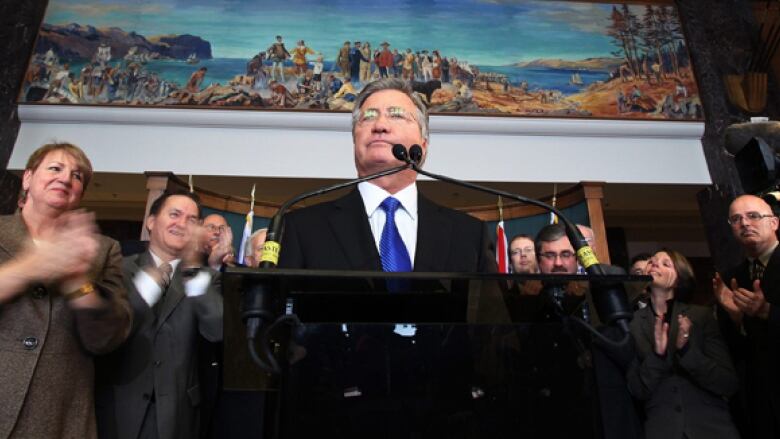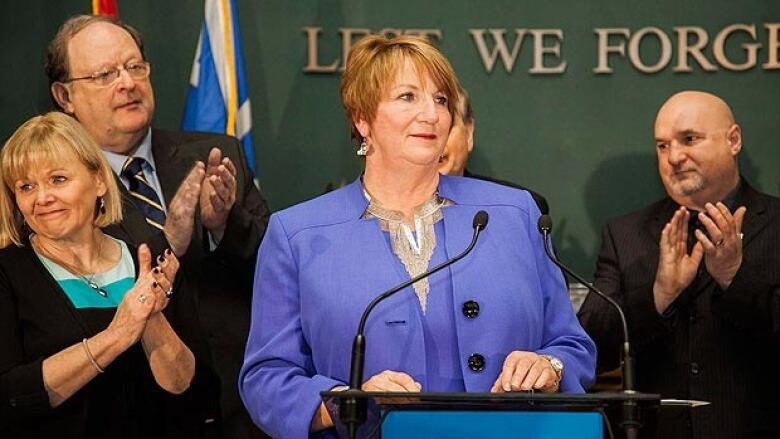Where have all the Muskrat Falls cheerleaders gone?
Stan Marshall's blunt assessment of project met with silence from former champions like Danny Williams

Danny Williams boldly statedin late 2010 he was so confident in the Muskrat Falls project that he would put his own money on the line, if he could.
Would the former outspoken Newfoundland and Labrador premier, who resigned from politics just weeks after making that statement, and inking a deal to develop the project, say thesame thing today?
That's a question CBC would like to put to Williams, but the No. 1 champion of the controversial and costly hydroelectric project has declined interview requests in recent days.
"Danny isn't available," was the latest email response fromWilliams' communications director, Elizabeth Matthews Williams.
CBC received the same response from Williamson June 24, the same day Nalcor Energy's new CEO, Stan Marshall,delivered the shocking news that the construction cost ofthe project hassoared by 30 per cent and is now projected to exceed $9 billion.
That's before financing costs, which are expected to add another $2 billion-plus.

The power station at Muskrat Falls is also two years behind schedule, and Nalcorand contractor Astaldiare locked in a dispute over costs, with Astaldi seeking hundreds of millions more in additional payments.
Marshall stated bluntly that Muskrat Falls was the wrong choice for Newfoundland and Labrador's power needs, and that it will impose "severe hardship" on rate payers, with utility costs expected to skyrocket in the coming years.
So does Williams now regret his unyielding support for the project? Did his desire to get back at Hydro-Quebec over the lopsided Upper Churchill deal cloud his judgment when it came to Muskrat Falls?
"It's part of the reason I got involved in politics," Williams once said of the Upper Churchill deal.
Williams is not talking, so we don't know.
His silence is noteworthy, considering he was defending the project in April, telling a Halifax audience he remained "unequivocally positive" about Muskrat Falls.
He's not the only one refusing to answer questions about what Stan Marshall agrees has grown intoa boondoggle.
Dunderdale, others also silent
Kathy Dunderdale, who was premier when the project was sanctioned in 2012 at a cost of $6.2 billion, has also avoided questions, holding firm on a self-imposed media moratorium that she implementedafter leaving politics two-and-a-half years ago.
"She is continuing to live her private life," the former premier'sdaughter, Sara Dunderdale, told CBC onWednesday.

High-profile lawyer Jerome Kennedy was the province's natural resources minister when Muskrat Falls was sanctioned, and like the two former Progressive Conservative premiers, he has not responded to an interview request.
Ed Martin is also laying low, despite having his successor, Stan Marshall, lay the blame squarely at his feet.
Martin steered the ship at Nalcoruntil his controversial departure in April.
When asked recently whyhe continues to have faith in someNalcorexecutives most notably Gilbert Bennettwho continually reassured the public that Muskrat Falls was a viable project,Marshall made the following comment:
"When I started in business I thought it didn't matter who was at the helm, that a big organization with momentum could achieve a good result. It really depends on who is in charge, the direction that is given to the people."












_(720p).jpg)


 OFFICIAL HD MUSIC VIDEO.jpg)
.jpg)



























































































